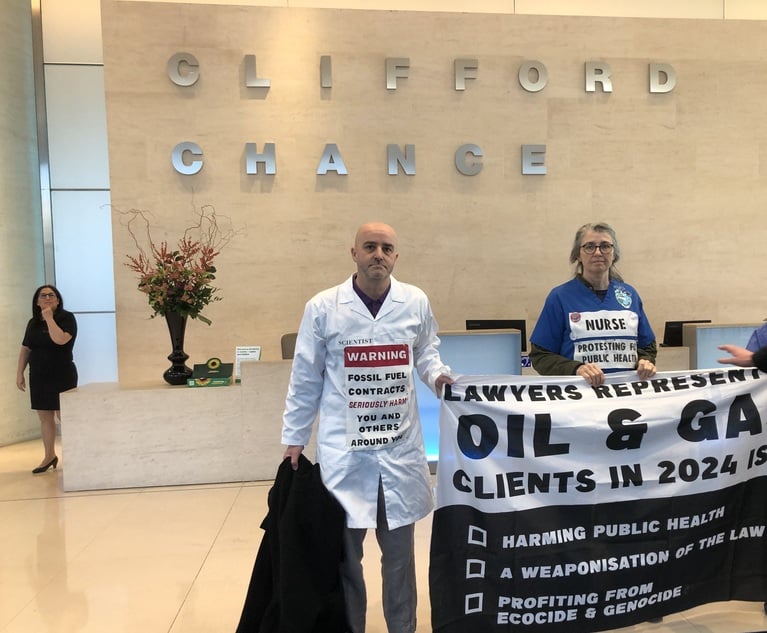Tomlinson stresses limits of Clifford Chance investigation into RBS lending practices
A Clifford Chance (CC) investigation into lending practices at the Royal Bank of Scotland (RBS) has been by criticised by the author of the report that instigated the probe.
April 23, 2014 at 08:25 AM
4 minute read
A Clifford Chance (CC) investigation into lending practices at the Royal Bank of Scotland (RBS) has been by criticised by the author of the report that instigated the probe.
CC's independent report, which was published last week, found "no evidence that RBS systematically set out to defraud its business customers".
The review was carried out in response to allegations in a report by Dr Lawrence Tomlinson that the bank's global restructuring group (GRG) put various business customers "on a journey towards administration, receivership and liquidation".
Tomlinson said it was "unsurprising" that CC did not find any clear evidence of fraud, something which Tomlinson said he had never accused the bank of.
"It's important to note that Clifford Chance did not investigate or reach conclusions on areas such as the validity of valuations and treatment of businesses," said Tomlinson, a former entrepreneur-in-residence at the Department of Business Innovation and Skills.
"I look forward to the [Financial Conduct Authority] publishing their findings later this year as their scope is much more robust, far reaching and, of course, independent."
For the report, CC interviewed 138 small business customers in the recovery unit, 45 employees and reviewed 130 files, comprising 400,000 pages and 1,200 documents.
CC identified several cases where RBS customers felt unclear of the way the bank charged fees, and allegations around the behaviour of RBS staff, although "no evidence" of this was found.
The bank also agreed to waive default interest for 90 days and wind down West Register – the vehicle the bank uses for bidding on property – acknowledging the perceived conflict of interest.
"We could not let this allegation hang over us," said the bank's CEO Ross McEwan. "That's why we acted quickly to appoint Clifford Chance to get to the truth of this claim. We are determined to earn back the trust of our customers."
Tomlinson said the CC report, which was overseen by regulatory partner Carlos Conceicao (pictured), made for damaging reading.
"I am struggling to understand headlines that the Clifford Chance report gives RBS a clean bill of health as their broader findings around the lack of fee transparency, lack of adherence to mandatory rules for internal valuations and need for an improvement in the business culture of GRG tally with the central themes of the Tomlinson Report and the patterns of behaviour I witnessed."
Clifford Chance declined to comment.
The report was originally due to be published in January, but – as revealed by Legal Week last month – faced delayed following difficulties in evidence collection.
Several businesses which passed on information to Tomlinson declined to forward evidence to CC, having previously encountered the firm as an adviser to the bank in restructuring litigation.
A source close to the matter said other businesses were nervous about forwarding commercially sensitive information to the magic circle firm, given its history of advising the bank.
In November, RBS stated that CC's instruction did not amount to a conflict of interest, despite the firm acting for the bank in various related restructuring and litigation matters.
Conceicao, who worked alongside partner Kelwin Nicholls on the matter, also referred volume matters related to the review to lawyers at TLT Solicitors and DMH Stallard, both of which bill at far cheaper rates.
The arrangement has allowed the bank to save more than half its initial budget for the investigation, according to one well-placed source.
This content has been archived. It is available through our partners, LexisNexis® and Bloomberg Law.
To view this content, please continue to their sites.
Not a Lexis Subscriber?
Subscribe Now
Not a Bloomberg Law Subscriber?
Subscribe Now
NOT FOR REPRINT
© 2024 ALM Global, LLC, All Rights Reserved. Request academic re-use from www.copyright.com. All other uses, submit a request to [email protected]. For more information visit Asset & Logo Licensing.
You Might Like
View All


Doctors and Scientists Lead Climate Protests at Each Magic Circle Firm

Trending Stories
Who Got The Work
Michael G. Bongiorno, Andrew Scott Dulberg and Elizabeth E. Driscoll from Wilmer Cutler Pickering Hale and Dorr have stepped in to represent Symbotic Inc., an A.I.-enabled technology platform that focuses on increasing supply chain efficiency, and other defendants in a pending shareholder derivative lawsuit. The case, filed Oct. 2 in Massachusetts District Court by the Brown Law Firm on behalf of Stephen Austen, accuses certain officers and directors of misleading investors in regard to Symbotic's potential for margin growth by failing to disclose that the company was not equipped to timely deploy its systems or manage expenses through project delays. The case, assigned to U.S. District Judge Nathaniel M. Gorton, is 1:24-cv-12522, Austen v. Cohen et al.
Who Got The Work
Edmund Polubinski and Marie Killmond of Davis Polk & Wardwell have entered appearances for data platform software development company MongoDB and other defendants in a pending shareholder derivative lawsuit. The action, filed Oct. 7 in New York Southern District Court by the Brown Law Firm, accuses the company's directors and/or officers of falsely expressing confidence in the company’s restructuring of its sales incentive plan and downplaying the severity of decreases in its upfront commitments. The case is 1:24-cv-07594, Roy v. Ittycheria et al.
Who Got The Work
Amy O. Bruchs and Kurt F. Ellison of Michael Best & Friedrich have entered appearances for Epic Systems Corp. in a pending employment discrimination lawsuit. The suit was filed Sept. 7 in Wisconsin Western District Court by Levine Eisberner LLC and Siri & Glimstad on behalf of a project manager who claims that he was wrongfully terminated after applying for a religious exemption to the defendant's COVID-19 vaccine mandate. The case, assigned to U.S. Magistrate Judge Anita Marie Boor, is 3:24-cv-00630, Secker, Nathan v. Epic Systems Corporation.
Who Got The Work
David X. Sullivan, Thomas J. Finn and Gregory A. Hall from McCarter & English have entered appearances for Sunrun Installation Services in a pending civil rights lawsuit. The complaint was filed Sept. 4 in Connecticut District Court by attorney Robert M. Berke on behalf of former employee George Edward Steins, who was arrested and charged with employing an unregistered home improvement salesperson. The complaint alleges that had Sunrun informed the Connecticut Department of Consumer Protection that the plaintiff's employment had ended in 2017 and that he no longer held Sunrun's home improvement contractor license, he would not have been hit with charges, which were dismissed in May 2024. The case, assigned to U.S. District Judge Jeffrey A. Meyer, is 3:24-cv-01423, Steins v. Sunrun, Inc. et al.
Who Got The Work
Greenberg Traurig shareholder Joshua L. Raskin has entered an appearance for boohoo.com UK Ltd. in a pending patent infringement lawsuit. The suit, filed Sept. 3 in Texas Eastern District Court by Rozier Hardt McDonough on behalf of Alto Dynamics, asserts five patents related to an online shopping platform. The case, assigned to U.S. District Judge Rodney Gilstrap, is 2:24-cv-00719, Alto Dynamics, LLC v. boohoo.com UK Limited.
Featured Firms
Law Offices of Gary Martin Hays & Associates, P.C.
(470) 294-1674
Law Offices of Mark E. Salomone
(857) 444-6468
Smith & Hassler
(713) 739-1250









